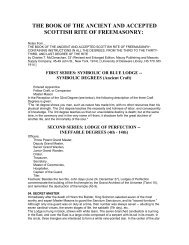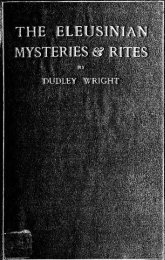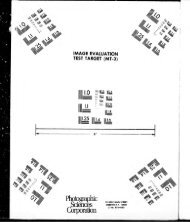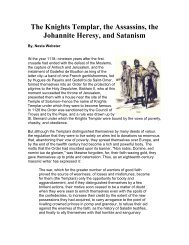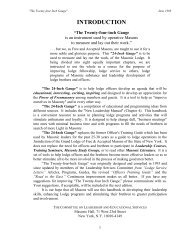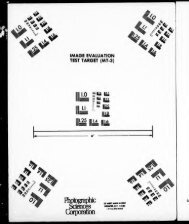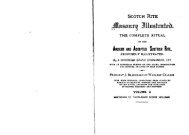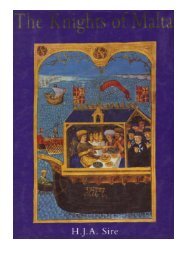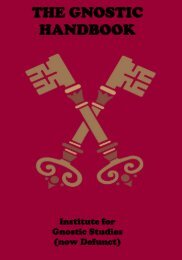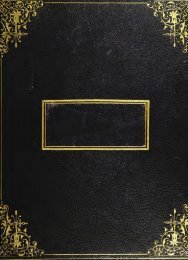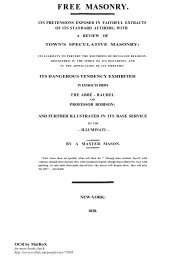The History of Initiation - The Masonic Trowel
The History of Initiation - The Masonic Trowel
The History of Initiation - The Masonic Trowel
Create successful ePaper yourself
Turn your PDF publications into a flip-book with our unique Google optimized e-Paper software.
EASTERN MYSTERIES. 59<br />
entombed within the Pastes or place <strong>of</strong> penance ; the door<br />
<strong>of</strong> which was said to be guarded by a terrible divinity,<br />
armed with a drawn sword, as the vindictive fury or god<br />
<strong>of</strong> punishment. During the course <strong>of</strong> his probation the<br />
aspirant sometimes acquired such a high degree <strong>of</strong> enthu-<br />
siasm, as induced him to refuse to quit his confinement in<br />
the pastes ; and to remain there until he literally perished<br />
with famine. To this voluntary martyrdom was attached<br />
a promise <strong>of</strong> never-ending happiness in the paradise <strong>of</strong><br />
Amidas. Indeed the merit <strong>of</strong> such a sacrifice was bound-<br />
less. His memory was celebrated with annual rejoicings.<br />
<strong>The</strong> initiations, 74 however, were dignified with an assurance<br />
<strong>of</strong> a happy immortality to all who passed through<br />
the rites honourably and with becoming fortitude.<br />
Amongst the amulets used on this occasion, two were<br />
75<br />
the most venerated ; a ring or circle <strong>of</strong> gold, as an emblem<br />
tocks to his heels, and clapping his hands over his head, to lift himself<br />
up seven hundred and fourscore times every day.<br />
74 Vid. Signs and Symbols. Lect. 10.<br />
75 <strong>The</strong> amulets within their dwellings were numerous ; every disease<br />
and misfortune having its appropriate charm. <strong>The</strong>re was also one,<br />
says Ksempfer, (Hist. Japan, b. v., c. 4) against poverty ; and this<br />
"<br />
author quaintly remarks, houses with this last mark must needs be<br />
very safe from thieves and housebreakers." But one <strong>of</strong> their mos<br />
efficacious amulets was the <strong>of</strong>arrai, or indulgence, which was usually<br />
presented to the devout pilgrim who had performed his devotions at<br />
the Temple <strong>of</strong> the most high god Tensio Dai Sin, at "<br />
Isge. This<br />
Ofarrai is a small oblong square box, about a span and a half long, two<br />
inches broad, an inch and a half thick, made <strong>of</strong> small thin boards, and<br />
full <strong>of</strong> thin small sticks, some <strong>of</strong> which are wrapped up in a bit <strong>of</strong> white<br />
paper, in order to remind the pilgrim to be pure and humble, these<br />
two virtues being the most pleasing to the gods. <strong>The</strong> name <strong>of</strong> the<br />
Temple Tai Singu, that is, the Temple <strong>of</strong> the great God, printed in<br />
large characters, is pasted to the front <strong>of</strong> the box, and the name <strong>of</strong> the<br />
Canusi who gave the box, for there are great numbers that carry on<br />
this trade, to the opposite side, in a smaller character, with the noble<br />
title <strong>of</strong> Taiju, which is as much as to say, Messengers <strong>of</strong> the gods, a<br />
title which all the <strong>of</strong>ficers <strong>of</strong> Mias assume to themselves. This Ofarrai,<br />
the pilgrims receive with great tokens <strong>of</strong> respect and humility, and<br />
immediately tie it under their hats, in order to keep it from the rain.<br />
<strong>The</strong>y wear it just under their forehead, and balance it with another<br />
box* or bundle <strong>of</strong> straw, much <strong>of</strong> the same weight, which they fasten<br />
to the opposite side <strong>of</strong> the hat. Those that travel on horseback have<br />
better conveniences to keep and to hide it. When the pilgrims are<br />
got safe home, they take especial care for the preservation <strong>of</strong> this<br />
Ofarrai, as being a relic <strong>of</strong> very great moment and consequence to<br />
them." (Ksempf. Japan, b. iii., c. 4.)



